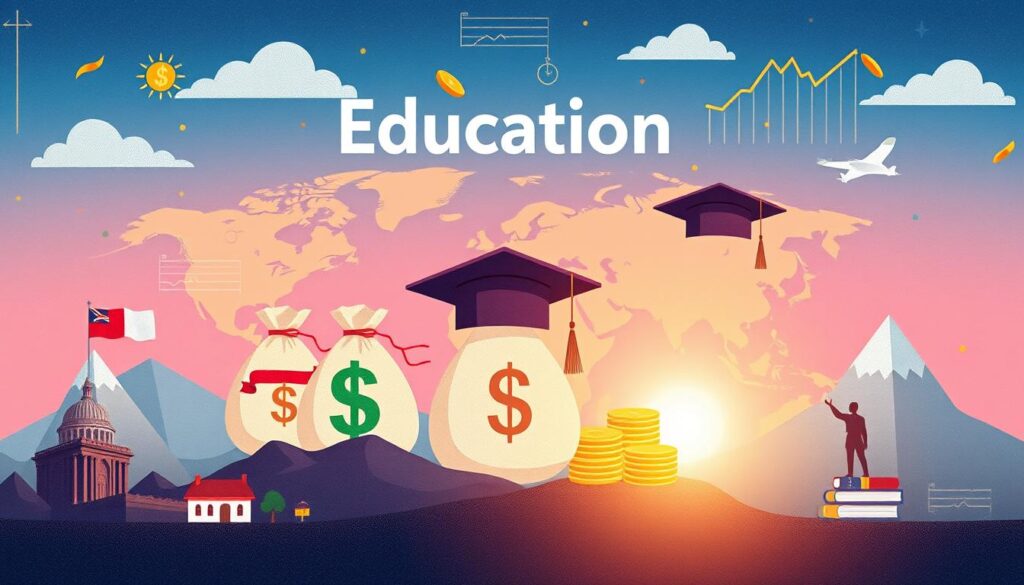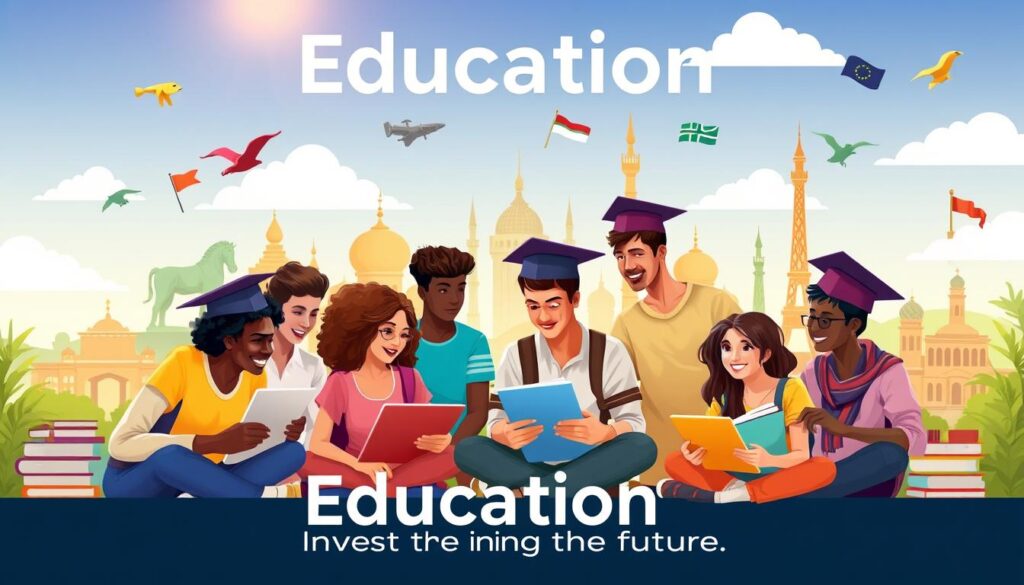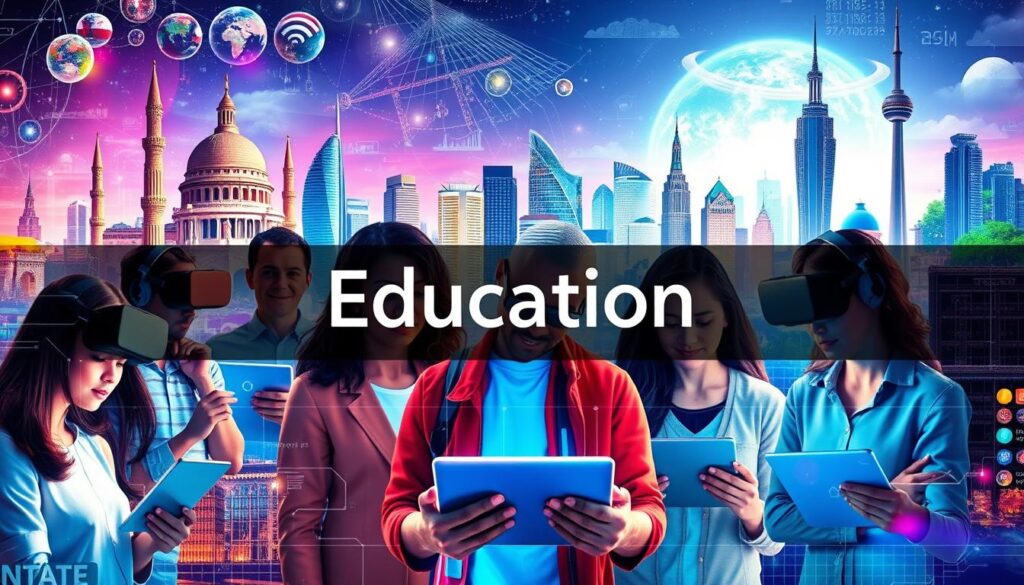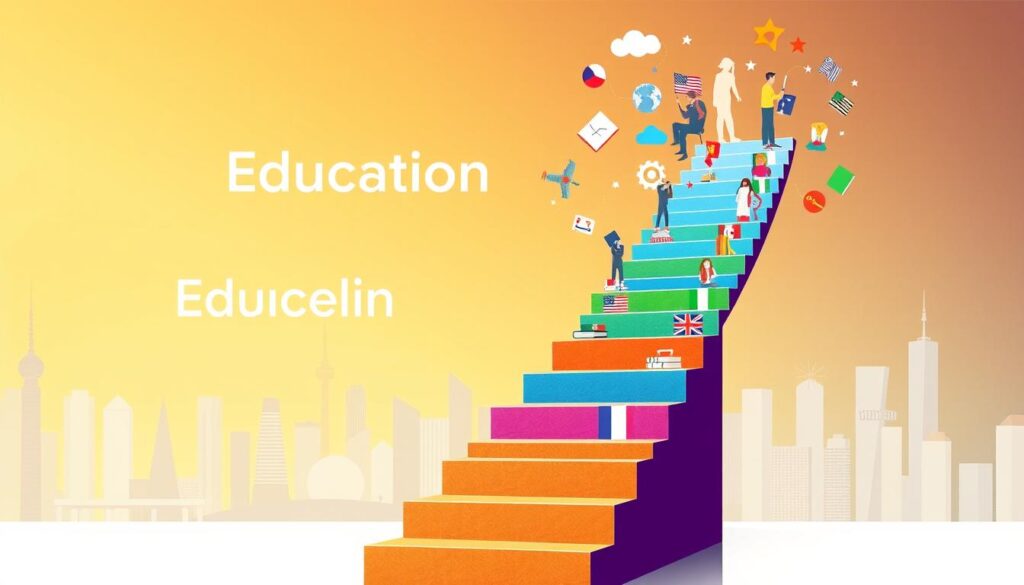By 2027, 70% of jobs will need education or training beyond high school. This shows how important tertiary education is for our future. It offers many benefits, like higher pay, better career chances, and personal growth. In South Africa, for example, it has led to more job opportunities and higher salaries.
We will look at how different countries view tertiary education. We’ll see how it benefits individuals and society. Getting a higher education can greatly improve your career and earnings. College graduates have 57% more job chances than those without a degree.
Key Takeaways
- Tertiary education can lead to higher earning potential and better job prospects.
- Investing in your future through higher education can have a significant impact on your career prospects.
- 70% of jobs are projected to require education or training beyond high school by 2027.
- College graduates see 57% more job opportunities than non-graduates.
- The average median salary of individuals with a bachelor’s degree increased by nearly 20% from 2020 to 2022.
- Tertiary education can provide numerous benefits, including career advancement and personal growth.
Understanding the Value of Tertiary Education in Today’s Global Economy
Tertiary education is key in today’s global economy. It gives people a chance to earn more and move up in their careers. The need for skilled and educated workers is growing fast.
Recent stats show that those with a postsecondary degree make more money. In 2023, people with an associate degree made $1,058 a week. Those with a bachelor’s degree made $1,493. This shows how important tertiary education is for your career and pay.
Going to college also gives you an edge in finding a job. Almost 70% of entry-level jobs need a bachelor’s degree. Plus, college graduates have lower unemployment rates. Only 2.2% of them are jobless, compared to 3.9% of high school graduates.
But tertiary education does more than help individuals. It also boosts the economy. There’s a link between more people going to college and higher GDP per capita. This shows how crucial tertiary education is for economic growth.
Financial Benefits of Pursuing Tertiary Education
Going to college can really help your finances and personal growth. It can make you earn more, get better jobs, and move up in your career. Studies show that jobs needing more education pay more. For example, those with a bachelor’s degree make about $1,305 a week, while high school graduates make $800.
Getting a degree gives you skills for new jobs and makes you stand out. People with a bachelor’s degree have a 2.2% unemployment rate. This is much lower than the 6.5% for those without a college degree. Also, college education can lead to better jobs, lower unemployment, and more financial security.

- Higher earning potential
- Improved employability
- Enhanced career prospects
- Increased competitiveness in the job market
- Greater economic stability
In short, going to college can greatly improve your finances and personal growth. It gives you an expanded skill set for better jobs and more job security.
| Education Level | Unemployment Rate | Average Weekly Earnings |
|---|---|---|
| Bachelor’s Degree | 2.2% | $1,305 |
| High School Diploma | 6.5% | $800 |
Career Advancement Opportunities Through Higher Education
Higher education opens doors to many career paths. It offers networking opportunities and chances to stay updated with industry trends. These benefits can lead to valuable insights and relationships.
In South Africa, tertiary education boosts job prospects and earnings. It teaches specialized skills that increase salaries. This can double or triple one’s income. Plus, it brings enhanced job security, allowing for long-term career planning.
Higher education has many advantages:
- Increased earning potential
- Broader networking opportunities
- More job opportunities
- Elevated professional confidence
- Improved creativity
Investing in higher education gives access to career services. These services help find internships and job placements. This can lead to promotions and higher-level jobs, enhancing job security and career success.
In summary, higher education offers many career benefits. It leads to networking opportunities and enhanced job security. Pursuing higher education equips individuals with the skills and knowledge for career success.
| Education Level | Median Weekly Earnings |
|---|---|
| Bachelor’s Degree | $1,493 |
| Master’s Degree | $1,737 |
| Professional Degree | $2,206 |
| Associate Degree | $1,058 |
| High School Diploma | $899 |
Enhanced Employment Security in Competitive Markets
Having a tertiary education can greatly improve your job security in today’s tough job market. It leads to better job satisfaction, a better work-life balance, and higher pay. For example, places like iQ Academy offer affordable, flexible online courses. This makes it easier for working people to get a higher degree and move up in their careers.
Some big benefits of tertiary education include:
- More money: People with higher degrees usually make more than those without.
- More respect: Employers and professional groups see value in degrees from recognized schools. This boosts your credibility at work.
- Better job chances: Getting a degree in Public Administration and Management can lead to bigger roles in different fields.

Getting a tertiary education gives you more skills, knowledge, and experience. This makes you more secure in your job and boosts your chances of success. We believe in the value of lifelong learning for career growth. So, we encourage everyone to keep learning and stay ahead in the job market.
Developing Critical Thinking and Analytical Skills
In tertiary education, we learn to think critically and analyze information. These skills are key for our personal growth and earning more. They help us solve problems, research, and make better decisions.
Studies show that critical thinking is a top skill employers want. It can be learned and improved with practice. By focusing on critical thinking, we become more creative, open-minded, and adaptable in our careers.
Developing these skills brings many benefits, including:
- Enhanced problem-solving skills
- Improved communication skills
- Increased adaptability and innovation
- Higher earning potential
- Personal growth and well-being
With these skills, we can make smart choices, analyze data, and handle complex issues. As Thomas Jefferson said, critical thinkers help us make informed decisions. So, it’s crucial to focus on developing these skills in our education and work.
| Skill | Benefit |
|---|---|
| Critical thinking | Enhanced problem-solving skills |
| Analytical thinking | Improved communication skills |
| Problem-solving | Increased adaptability and innovation |
Social and Networking Advantages
Tertiary education brings many social and networking benefits. It helps us grow our expanded skill set and connect with peers and professionals. These networking opportunities give us valuable insights and keep us updated on industry trends. They also boost our chances of success.
Some key benefits of tertiary education include:
- Increased earning potential, with adults with a bachelor’s degree earning over twice the amount compared to those without one over their lifetimes
- Higher employment rates, with 86% of individuals aged 25 to 34 with a bachelor’s degree or higher being employed as of March 2020
- Greater self-confidence, leading to quicker promotions and higher wages
Research shows that college graduates tend to have stable marriages, longer lives, and better health. Networking opportunities also lead to new friendships and connections. By investing in tertiary education, we can expand our skill set and improve our career prospects.

In conclusion, tertiary education offers undeniable social and networking benefits. Pursuing higher education opens new doors, builds meaningful relationships, and helps us reach our career goals.
The South African Perspective on Tertiary Education
In South Africa, tertiary education is key for the country’s economic growth. It’s important to understand local market needs, industry partnerships, and government plans. The Council on Higher Education (CHE) says higher education aims to make responsible citizens and share knowledge.
The benefits of tertiary education in South Africa are many. They include enhanced job security and better pay. The CHE also says higher education should meet society’s needs and provide skilled workers. Some main goals for higher education in South Africa are:
- Increased participation
- Restructuring the system to meet economic needs
- Supporting democratic ethos
- Improving quality of teaching
- Implementing funding mechanisms
By looking at the South African view on tertiary education, we see its big role in economic growth. The benefits of tertiary education are clear. We must keep supporting and investing in this area for a better future for all South Africans.
Personal Growth and Development Opportunities
Going to college can really change your life. It lets you explore what you love, learn new things, and feel more confident. This can help you move up in your career and earn more money.
A study by the University of Essex shows many benefits of college. You get to find your passions, grow personally, and meet new people. These things can make you more aware of yourself, more confident, and happier. Investing in your future means you’ll likely see big improvements in your career and personal life.
Some big pluses of college include:
- More job chances, with college grads finding 57% more jobs than those without a degree
- Higher pay, with college graduates making an average of $67,500 a year
- Less unemployment, with only 2.3% of those with a bachelor’s degree jobless

By choosing to go to college, you open doors to personal growth and new opportunities. You’ll have a better chance at advancing in your career, earning more, and reaching your goals.
| Benefit | Description |
|---|---|
| Increased access to job opportunities | College graduates see 57% more job opportunities than non-graduates |
| Higher earning potential | The average salary of a bachelor’s degree recipient is $67,500 per year |
| Lower unemployment rates | The unemployment rate for those older than 25 with bachelor’s degrees is 2.3% |
Global Mobility and International Recognition
Exploring tertiary education reveals its global benefits. Studying abroad or joining international projects broadens perspectives. It also boosts skills and job prospects worldwide. This education path leads to better earnings and economic growth.
Today, about 2 million students are international learners. By 2025, this number is expected to hit 15 million. This shows how vital global education is becoming.
Key benefits of international education include:
- Developing cross-cultural competencies
- Improving employability skills, such as interpersonal and communication skills
- Increasing job opportunities, particularly in terms of soft skills development
Studies show employers value generic and practical skills. Studying abroad can make you more employable globally. It’s a smart move for those aiming for better economic futures.
In summary, tertiary education offers global mobility and recognition. It opens doors to new skills and job opportunities worldwide. The potential for higher earnings makes it a valuable investment for economic growth.
| Country | Number of International Students |
|---|---|
| United States | 1,094,792 |
| United Kingdom | 436,610 |
| Australia | 693,750 |
Innovation and Entrepreneurship Possibilities
Exploring tertiary education shows us how personal growth and an expanded skill set are key for innovation and entrepreneurship. Over 80% of digitally mature companies see innovation as a core strength. This is why businesses are eager to create a culture that supports innovation and entrepreneurship.
Some important statistics about innovation and entrepreneurship include:
- 65% of fast-growing companies work with customers on new ideas
- The video streaming market is expected to hit over $100 billion in five years
- More than 90% of businesses worldwide are SMEs, employing half the world’s population
Getting a tertiary education can help you develop the skills for innovation and entrepreneurship. This can lead to more economic growth and job opportunities. Salesforce, a leading CRM service, shows how innovation and entrepreneurship can lead to success.

The possibilities for innovation and entrepreneurship are vast. Tertiary education can lay the groundwork for personal growth and an expanded skill set. These are essential for thriving in today’s fast-paced business world.
| Company | Innovation Strategy |
|---|---|
| Salesforce | Collaboration with customers on potential innovations |
| Investment in research and development | |
| Amazon | Focus on customer needs and preferences |
Work-Integrated Learning Benefits
We know how important work-integrated learning is for our careers. It gives us networking opportunities. By joining these programs, we get real-world experience, learn new skills, and boost our job prospects. This leads to enhanced job security and better economic growth.
The University of Essex says work-integrated learning has many perks. It lets us explore our passions, grow personally, and find networking opportunities. We can pick up new skills, feel more confident, and succeed in our careers. Key benefits include:
- Practical experience gains
- Industry exposure
- Opportunities for reflection and feedback
- Facilitating relationships and building networks
Learning by doing helps us develop skills and confidence. Networking opportunities and enhanced job security are just a few perks. As we face the job market’s challenges, focusing on work-integrated learning is crucial.

Work-integrated learning can boost economic productivity, competitiveness, and growth. We must see its value and make it a key part of our education and career plans.
Digital Literacy and Technological Advancement
Digital literacy and tech progress are key in today’s world. Tertiary education helps a lot with career growth. Since COVID-19, tech use in learning has risen by 19 percent on average.
Some tech areas have grown a lot. For example:
- Connectivity and community-building techs have grown by 49 percent.
- Tools for group work have seen a 29 percent increase.
- 67 percent of people use classroom interaction techs.
These techs have made learning better. They’ve also taught students important skills like digital literacy and problem-solving. It’s vital to focus on digital literacy and tech in education.

This way, our students will be ready for a tech-driven world. They’ll be able to use their education to get ahead in their careers.
| Technology | Growth Rate |
|---|---|
| Connectivity and community-building technologies | 49% |
| Group work tools | 29% |
| Classroom interaction technologies | 67% |
Research and Knowledge Creation Opportunities
Tertiary education opens doors to many research and knowledge creation chances. It lets us publish our work and help advance our fields. By learning to solve problems logically, we improve our skills in research, analysis, and making decisions.
Studies show universities focus on research to learn and discover. This effort boosts our higher earning potential and personal growth. Key research areas include:
- STEM fields, like science and engineering
- Social sciences, often involving big grant teams
- Arts and humanities, needing less funding
- Medical research, which is costly and requires big investments
University research helps the economy, healthcare, and business grow. It benefits our community, region, and state. By going for tertiary education, we unlock these opportunities for personal growth and higher earning potential.
As we move forward in our careers, we must value research and knowledge creation. They drive innovation, entrepreneurship, and economic growth. Investing in tertiary education brings us these benefits, leading to a better future for us and our communities.
| Research Area | Benefits |
|---|---|
| STEM fields | Economic development, clinical advancements |
| Social sciences | Commercial opportunities, business growth |
| Arts and humanities | Personal growth, cultural enrichment |
| Medical research | Improved healthcare, medical breakthroughs |
Long-term Economic Impact of Tertiary Education
Tertiary education has a big impact on our economy. It makes us more productive and competitive. By investing in our future, we can get better jobs and earn more.
The expanded skill set and networking opportunities from tertiary education boost innovation and entrepreneurship. This leads to economic growth.
Some key benefits of tertiary education include:
- Increased economic productivity and competitiveness
- Enhanced job security and benefits
- Expanded skill set and networking opportunities
- Increased innovation, entrepreneurship, and economic growth
The World Bank says education is key to economic growth. For example, education helped the Republic of Korea become one of the world’s richest countries. College graduates earn more than those with only a high school diploma.

Workers with a bachelor’s degree earn 56 percent more than high school graduates. Those with an associate’s degree earn 21 percent more. The return on a college degree is around 15 percent, showing it’s worth the investment.
| Education Level | Average Annual Earnings |
|---|---|
| Bachelor’s Degree | $64,500 |
| Associate’s Degree | $50,000 |
| High School Diploma | $41,000 |
Future-Proofing Your Career Through Education
The job market keeps changing, with automation and AI taking over many tasks. To stay ahead, focus on career advancement and investing in your future. Learning new skills like digital literacy, data analytics, and emotional intelligence is key for success today.
Here are some ways to future-proof your career:
- Develop adaptability and learning agility for career transitions and new opportunities
- Grow your mind by setting big goals and always learning
- Boost creativity and innovation to succeed in business and solve tough problems
Studies show that going to college can make you more productive, improve your communication, and boost your confidence. Higher education opens doors to new jobs, leadership roles, and higher pay. As the job market changes, investing in your future through education is vital for success.

In today’s digital world, keeping up with new tech and trends is crucial. This helps us advance our career advancement and stay competitive. Whether it’s an online degree in data analytics or emotional intelligence, the goal is to keep learning and adapting.
Conclusion
Investing in tertiary education opens doors to new opportunities. It boosts our earning power and career chances. It also sharpens our critical thinking and problem-solving skills, which employers value a lot.
The good effects of tertiary education go beyond us. It helps the economy grow and society improve. Tertiary graduates drive innovation and create new industries. This leads to economic growth and helps fight poverty and improve healthcare.
If you’re a high school student or a working adult looking to advance, tertiary education is a smart choice. It offers benefits of pursuing tertiary education and higher earning potential. By taking this path, we can reach our full potential and make a positive impact on our communities and the world.
FAQ
What are the benefits of pursuing tertiary education?
Tertiary education boosts your earning power and career growth. It also helps you grow personally and develop new skills. You’ll get to network and feel more secure in your job.
How does tertiary education impact the global economy?
Tertiary education is key to the global economy’s success. It increases productivity and competitiveness. New trends like online learning and international partnerships are changing how we learn.
What are the financial benefits of pursuing tertiary education?
Tertiary education can make you more employable and increase your earnings. It also helps you grow personally by developing new skills and confidence.
What are the career advancement opportunities through higher education?
Higher education opens doors to various career paths. It offers professional certifications and leadership roles. Networking can also lead to valuable insights and job security.
How can tertiary education enhance employment security in competitive markets?
In a competitive job market, tertiary education is a big plus. It equips you with skills and knowledge for success. This leads to better job satisfaction and higher earnings.
How does tertiary education develop critical thinking and analytical skills?
Tertiary education sharpens your critical thinking and analytical skills. It teaches you to solve problems logically. This boosts your problem-solving and decision-making abilities, leading to better career prospects.
What are the social and networking advantages of tertiary education?
Tertiary education expands your skill set and helps you network. It connects you with peers and professionals. This can give you valuable insights and industry trends.
What is the South African perspective on the role of tertiary education?
In South Africa, tertiary education is vital for economic growth. It aligns with local market demands and government initiatives. This understanding can lead to better job security and personal growth.
What are the personal growth and development opportunities in tertiary education?
Tertiary education offers many personal growth chances. It lets you explore your passions and develop new skills. This investment can boost your career and achieve your goals.
How can tertiary education provide global mobility and international recognition?
Tertiary education opens doors to global opportunities. It allows for international study and collaborations. This can give you a global perspective and increase your job market success.
What are the innovation and entrepreneurship possibilities in tertiary education?
Tertiary education fosters innovation and entrepreneurship. It teaches you to solve problems creatively. This can lead to new ideas and economic growth.
What are the benefits of work-integrated learning?
Work-integrated learning offers practical experience and industry exposure. It helps you develop skills and gain confidence. This can improve your job prospects and networking opportunities.
How can tertiary education enhance digital literacy and technological advancement?
Tertiary education boosts your digital literacy and technological skills. It prepares you for a tech-driven world. This can lead to career advancement and economic growth.
What are the research and knowledge creation opportunities in tertiary education?
Tertiary education fosters research and knowledge creation. It allows for academic publications and field advancements. This can lead to personal growth and innovation.
What is the long-term economic impact of tertiary education?
Tertiary education has a lasting economic impact. It increases productivity and competitiveness. It also enhances job security and benefits, contributing to economic growth.
How can tertiary education help future-proof your career?
Tertiary education prepares you for the future. It develops new skills and confidence. This can lead to career advancement and economic growth.
Source Links
- Top 10 Benefits of a University Education Every Parent or Guardian Should Know | Blog | University of Essex
- The ROI of a Bachelor’s Degree
- Tertiary Education
- The Value of Higher Education in Developed Economies – HEPI
- Overview
- Top 7 Reasons Why College is Important
- How Education and Training Affect the Economy
- What are The Benefits of University Education? | SUSS
- 10 Benefits of Education That Will Surprise You
- The Value of Education: Investing in Your Future
- The Benefits of Higher Education: How It Can Change Your Life
- 5 Benefits of Continuing Education for Career Advancement
- Quality Education at Accredited Institutions like iQ Academy
- Investing in Quality Education for Economic Development, Peace, and Stability
- Critical Thinking in Education: How to Prepare Students for the Future
- 7 steps to uplevel your critical thinking skills [2024]
- Why Is Critical Thinking Important and How to Improve It
- 10 Benefits of Higher Education – MSU Denver
- Five Reasons Why Education Helps to Advance Your Career at Any Level | Cornerstone University
- 13 Benefits of Going to College – Bay Atlantic University – Washington, D.C.
- 2528CHE_AnnRwFInal:Design
- The Challenges of Transformation in Higher
- Education Is Still Important For Your Career: 5 Compelling Benefits
- Microsoft Word – 05 jibeen ijeredec15 edit
- Innovation in business: Importance, benefits, & examples
- Entrepreneurship and innovation: Ideas and opportunities for startups
- Work-Integrated Learning
- Microsoft Word – WIL Employer Survey ENG
- How technology is shaping learning in higher education
- The Impact of Technology on Education
- Impacts of digital technologies on education and factors influencing schools’ digital capacity and transformation: A literature review
- The Role Of Research At Universities: Why It Matters
- Rethinking higher education and its relationship with social inequalities: past knowledge, present state and future potential – Humanities and Social Sciences Communications
- Tertiary education is essential for opportunity, competitiveness, and growth
- Microsoft Word – RSC IOP Economic Benefits HE 01 feb 2005 FINAL FORMATTED V…
- Do the Benefits of College Still Outweigh the Costs?
- Why Future-Proofing Your Career Matters
- Future-Proofing Your Career: 6 Essential Skills for the Digital Age
- What Encourages Longer Educational Careers in Tertiary Education? A Three-Level Approach for the Case of Romanian Universities
- What are the long-term benefits of further study?
- Education and Economic Development: Exploring Their Symbiotic Bond



